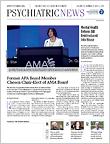In 2006, the Food and Drug Administration (FDA) issued a public health advisory on the possible increased risk of persistent pulmonary hypertension of the newborn (PPHN)—a rare but severe and potentially fatal respiratory disease—to babies born to women who took selective serotonin reuptake inhibitors (SSRIs) during late pregnancy.
This warning was based primarily on one large study that suggested SSRI use after 20 weeks resulted in a sixfold increased risk of PPHN. Since then, however, subsequent research has produced conflicting results as to whether this risk is genuine. As a result, the FDA revised their warning in 2011, stating that it was premature to link SSRIs with PPHN.
However, no definitive answer exists yet for this important question, noted Krista Huybrechts, Ph.D., an assistant professor of medicine at Brigham and Women’s Hospital and Harvard Medical School.
“While PPHN is quite rare, antidepressants, especially SSRIs, are frequently used during pregnancy, which means there are a lot of women who may be potentially at risk,” she said.
To investigate this issue, Huybrechts led a comprehensive analysis of over 3.7 million pregnant women enrolled in Medicaid between 2000 and 2010. (The studies that have not found any connection between SSRIs and PPHN have been in small populations, and thus may not have been able to uncover small changes in risk.)
Within this maternal population, 128,950 women were taking an antidepressant within 90 days of giving birth—and in about 80 percent of these instances (102,179), it was an SSRI.
Huybrechts and colleagues compared the rates of PPHN in the different groups, finding that 7,630 infants not exposed to antidepressants were diagnosed with PPHN (about 20.8 per 10,000 births) compared with 322 infants exposed to SSRIs (about 31.5 per 10,000) and 78 infants exposed to other antidepressants (about 29.1 per 10,000).
While the absolute rates where about 50 percent higher, when the authors adjusted for other differences between the antidepressant and unexposed groups, they found no statistical differences in PPHN rates for any of the groups.
“When we did some secondary analyses with different scenarios, we did find that SSRI use led to a slightly increased risk in PPHN cases that did not have other contributing factors like congenital heart defects or premature birth,” Huybrechts said.
“However, given that the changes were so modest, I would be cautious in making any claims that SSRIs do increase PPHN risks in this instance.”
And since most of the women were taking SSRIs, Huybrechts noted that her study could not draw any conclusions as to differing risks among various types of antidepressants.
“SSRIs are the most common, and therefore the most intensely studied antidepressants,” she said. “However, it would be worthwhile to explore the risks of other types of antidepressants in more detail, as well as other psychotropic medications, which are becoming increasingly used during pregnancy.”
Still, based on these findings, Huybrechts told Psychiatric News the message for pregnant women remains encouraging. “While we did not rule out a connection between SSRI use and an increased risk of PPHN, the risk—if any—is much smaller than previous studies have suggested,” she said.
The study by Huybrechts and colleagues was published June 2 in JAMA and was supported by a grant from the Agency for Healthcare Research and Quality. ■
“Antidepressant Use Late in Pregnancy and Risk of Persistent Pulmonary Hypertension of the Newborn” can be accessed
here.
